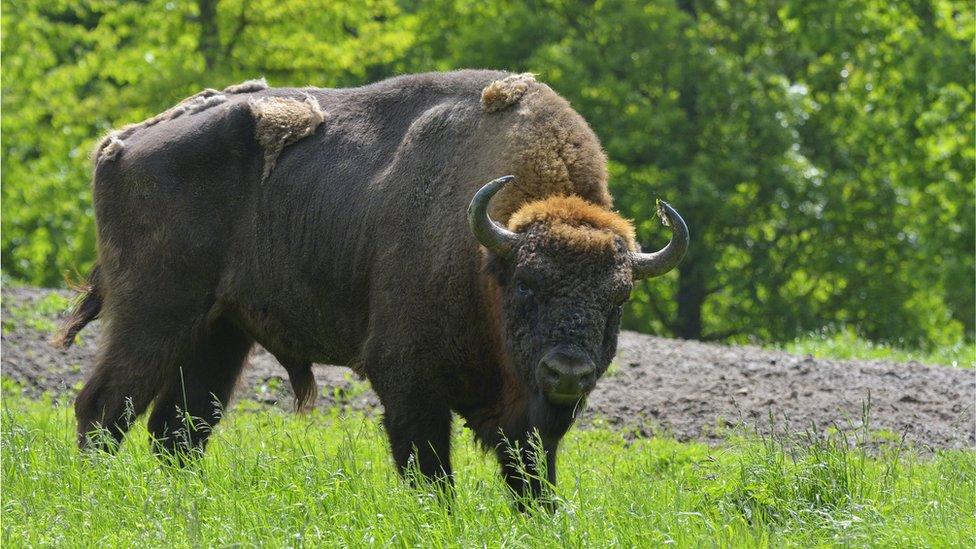Meet the UK's first ever bison rangers!
- Published
- comments

A four-strong herd of European bison will be released into Kent woodland in 2022. The breed is the closest living relative to ancient steppe bison, which once roamed Britain
Imagine getting a job as the UK's first bison ranger!
Well, it's an amazing reality for Tom Gibbs and Donovan Wright who have just started work in one of the largest areas of ancient woodland in the country.
The pair were chosen after more than 1,000 people from across the world applied to help introduce the huge mammals into ancient woodland in Kent.
A close-knit herd of four European bison will live in Blean Woods near Canterbury in an effort to restore the habitat.
What is a bison ranger?
The bison will help restore the natural habitat of the area, conservationists say
The bison ranger roles were created by Kent Wildlife Trust and Wildwood Trust as part of a major conservation project.
The rangers will help look after four bison who are being introduced to the Blean Woods in 2022 to restore the ecosystem of the ancient woodlands through nature-based solutions.
Nature-based solutions involve working with nature to find sustainable ways of tackling environmental challenges, providing benefits for both human well-being and biodiversity.
Rangers will also be responsible for health checks, safety, maintaining gates and fences round the project, planning, and monitoring visitors with the bison.
Using species like bison offer a sustainable approach where nature can take the lead and restore degraded ecosystems and lost species.
Mr Gibbs, who previously worked as conservation officer for Herts and Middlesex Wildlife Trust, said he was thrilled to have been chosen for the "once in a lifetime opportunity".
He added: "The UK is one of the most nature-depleted countries in the world.
"Unfortunately, sometimes traditional conservation practices haven't been able to halt these losses, so wilding and using species like bison offer a sustainable approach.
"This...creates a healthier environment that provides us all with water, food and air, while helping us reconnect with these wild and natural landscapes."
Patches of bare earth created by the bison dust bathing are good for lizards and rare weeds, while fungi and insects such as stag beetles make use of deadwood
Joining him is Mr Wright, who has more than 20 years' experience conducting walking safaris and drives in some of Africa's most famous reserves.
He said: "I can't wait... to help visitors to the Blean experience wild European bison on foot in the UK and show them how they restore nature and increase biodiversity, while working towards the ultimate goal of seeing bison restoring woodlands across the UK."
The European bison is slightly larger and longer-legged than the American bison, but is less heavy.
The European bison's range originally extended eastward across Europe to the Volga River and the Caucasus Mountains
It became extinct in the wild after World War One
Herds were later established from zoo-bred animals in Belarus, Poland, Lithuania, Russia and Ukraine
Why is Bison being used for conservation?
The bison will be brought in from mainland Europe
Despite their size, with adult males weighing up to a tonne, bison are peaceful, and no other species can perform the job of engineering the habitat in the same way.
They fell trees by rubbing up against them and eating the bark, creating areas of space and light in the woods and providing deadwood which will help other plants and animals.
They create patches of bare earth by dust bathing, which can provide habitat for insects and lizards.
The conservation organisations said the bison must be kept in as wild a state as possible to display their natural behaviour and have the greatest positive impact on the environment, so careful management will be essential.
What do you make of this story? Would you like to visit the bison when they're in the UK?
- Published21 May 2021
- Published5 June 2020
- Published29 October 2020
